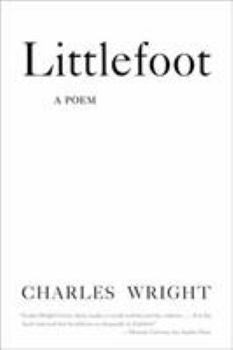Littlefoot
Select Format
Select Condition 
Book Overview
Littlefoot, the eighteenth book from one of this country's most acclaimed poets, is an extended meditation on mortality, on the narrator's search of the skies for a road map and for last instructions on "the other side of my own death." Following the course of one year, the poet's seventieth, we witness the seasons change over his familiar postage stamps of soil, realizing that we are reflected in them, that the true affinity is between...
Format:Paperback
Language:English
ISBN:0374531218
ISBN13:9780374531218
Release Date:June 2008
Publisher:Farrar, Strauss & Giroux-3pl
Length:104 Pages
Weight:0.35 lbs.
Dimensions:0.3" x 5.6" x 8.3"
Customer Reviews
3 ratings
After Image-Picking
Published by Thriftbooks.com User , 16 years ago
One way to read "Littlefoot" is as an imagist's attempt to write a long poem. (Wright aptly calls himself an "image-picker" somewhere in this book.) It is a single poem rather than a sequence; in fact, the "plot" connecting nearby poems -- the progression of seasons -- is often clearer than the loose thematic connections between the segments of an individual poem. As Wright explained in "Apologia pro Vita Sua," his basic form is the journal. The "journal" -- of Wright's 70th year -- tracks his thoughts and surroundings from one October to the next. Wright has always been admired for his ability to write so interestingly about so little; in "Littlefoot," the subject matter has dwindled to essentially nothing, and the writing is as good as ever. All the poems are in Wright's usual two-step free verse line (lines that begin in lowercase are indented): The great mouth of the west hangs open, mountain incisors beginning to bite Into the pink flesh of the sundown. (14) When the rains blow, and the hurricane flies, nobody has the right box To fit the arisen in. Out of the sopped earth, out of dank bones, They seep in their watery strings wherever the water goes. Who knows when their wings will dry out, who knows their next knot? (1) The stars drift like cold fires through the watery roots of heaven (13) A little knowledge of landscape whets isolation. This is a country of water, of water and rigid trees That flank it and fall beneath its weight. They lie like stricken ministers, grey and unredeemed. (20) Tree-shadows lying like limbed logs across the meadow, Sinking into the hill's shadow that stalks them... (21) I remember the way the mimosa tree buttered the shade Outside the basement bedroom, soaked in its yellow bristles. (1) I love the winter light, so thin, so unbuttery, Transparent as plastic wrap, Clinging so effortlessly to whatever it skins over. (14) Pipistrello, and gun of motorcycles downhill, A flirt and a gritty punctuation to the day's demise And one-starred exhalation, (32) Stars like motorcycle exhaust Through the limp leaves of maple trees (33) As these examples indicate, the descriptions pile up and provide a rich context for each other (keeping "unbuttery" fresh rather than weird), and the last image, in particular, has the weight of the whole book's seeing and thinking behind it. The narrative sections work this way too -- e.g. the story of the Hunter Gracchus is introduced in poem 9, and in poem 24 is applied to the quarter moon "like a sail with no ship / and no port to come home to." The straight-up philosophizing merges into the general currents of thought, too, but it's less compelling as writing than the bits that have their eye on the actual world. One virtue that Wright's later verse tends to lack is tautness. The gentle meandering of this long poem might irritate some readers -- not me, surprisingly enough! -- who should still enjoy the poems collected in "Negative Blue" and earlier volumes.
Another work of genius
Published by Thriftbooks.com User , 17 years ago
Few poets have been as successful at finding the spiritual in the ordinary as Charles Wright has -- Louise Gluck comes to mind, and possibly Jack Gilbert -- but even these titans have not represented the metaphysics of the quotidian as consistently and convincingly as Wright. In a large portion of Wright's poetry the setting is the same: Wright is sitting on his porch chair in his backyard -- sounds boring doesn't it -- but it's not -- because Wright's not just sitting in his backyard, he's sitting in eternity and beholding heaven with all of its rough edges. There is a gospel in the landscape, a language amid the peony blossoms and the sparrows.
brilliant light
Published by Thriftbooks.com User , 17 years ago
Just back from a few days in Charlottesville where I was able to read this out (and the series of poems in the current edition of the Virginia Quarterly Review) on the screened-in porch. Although the book is subtitled "a poem," it's really a cycle of well paced poems in which Wright brings us through meditations on aging, philosophy, and best guessed conclusions with linguistic certainty. If you've been lucky enough to have been reading Wright for a while, read this when you can. If you're new to the poet, it's a good place to start to begin a reading relationship that will challenge, relax, entertain, and satisfy.





